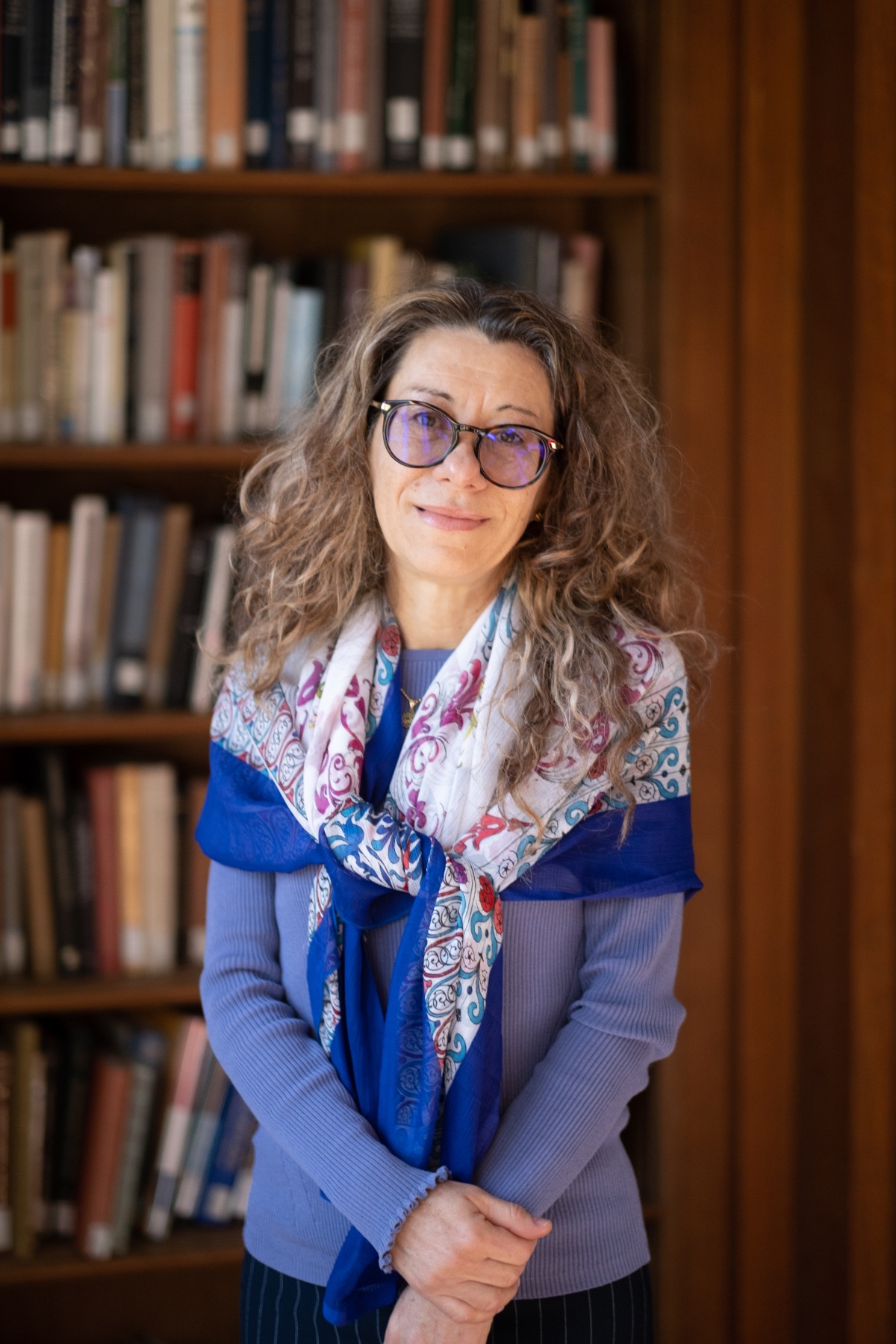Roberta Ricci

Contact
Academic Departments
Education
- MA and Ph.D. in Italian Studies, Johns Hopkins University
- BA and MA in Philology and Variantistica summa cum laude, Università degli Studi di Pisa
Research Interests
Medieval and Renaissance Literature, Humanism, Classical Studies, Philology, Paleography, Byzantine Studies, History of Manuscripts, Ecdotics, Hodoeporics, Comparative Literature, Comparative Codicology, Reception Studies.
Biography
Book project in progress: The Pendulum of Identity: a Trans-historical Empire on transculturality that stems from migration of portabilia and memorabilia in early-modern Byzantine society and its extensions, both physical and imagined.
Books:
- 1. Reading Primo Levi: Essays in Dialogue with Nicholas Patruno Northeast Modern Language Association Italian Studies Press, vol. XLV, 2024, p. 266. This volume points toward a profusion of pathways into and through Levi’s writings, by opening perspectives that are both historical and theoretical, archival and actual, textual and cinematographic, with the hope to reenergize scholarly conversations and new intellectual debates not only to capture the perduring risk of fascism, racism, and antisemitism today, but also the power of Levi's creative vein and originality. Ricci contributed with an essay titled Nicholas Patruno in Dialogue with Primo Levi: So that Memory Never Fades and a critical edition of an unpublished interview by Patruno to Eugenio Montale, titled Intervista a Eugenio Montale sulla traduzione.
- 2. Poggio Bracciolini and the Re(dis)covery of Antiquity: Textual and Material Traditions. Proceedings of the Symposium Held at Bryn Mawr College on April 8-9, 2016. Firenze University Press, 2020. The essays touch upon intertwined aspects of early Renaissance in its recovery of the classical tradition where the concept of humanitas extends to the manuscript itself. Ricci contributed with an essay titled: Shifting Times, Convergent Futures: Technologies of Writing Beyond Poggio Bracciolini "With a powerful impact on readership and authorship, Bracciolini stands behind this groundbreaking entanglement, as we rethink textual transmission and modern scholarship in this digital age," says Ricci. Her research is described here Italian Chair Roberta Ricci Travels to Italy to Study the Work of Poggio Bracciolini
- 3. The Renaissance Dialogue, Northeast Modern Language Association Italian Studies Pres, 2016. The bulk of the essays elaborates on questions connected with geo-political issues, pluralism, diversity, and ongoing social and moral interactions, reflecting on how strongly they resonate in early-modern time and today. Ricci contributed with an essay titled: Umanesimo letterario, riforma grafica: Poggio Bracciolini editore, filologo e copista, pp. 2-38]
- 4. Approaches to Teaching the Works of Primo Levi, New York, MLA Press, 2014. Primo Levi, Holocaust survivor and renowned memoirist, is one of the most widely read writers of post–World War II Italy. His works are characterized by the lean, dispassionate eloquence with which he approaches his experience of incarceration in Auschwitz. His memoirs—as well as his poetry and fiction and his many interviews—are often taught in several fields, including Jewish studies and Holocaust studies, comparative literature, and Italian language and literature, and can enrich the study of history, psychology, and philosophy.
- 5. Scrittura, riscrittura, autoesegesi: voci autoriali intorno all’epica in volgare. Boccaccio, Tasso, ETS Press, 2011. The idea of reflecting upon one’s own art is probably as old as literature itself and has its sense of participation in a wider literary tradition because it serves to overcome the medieval distinction between those who agunt de arte (the critics) and those who agunt per artem (the writers). Comments and marginalia written by authors as explanations of their own work add a new literary dimension to the richness of the text itself because this self-exegesis opens issues concerned with critical inquiry, authorship, readership, and reception.
Product of Courses and Final projects
ITAL 303 Boccaccio, The Plague, and Epidemic Illness (Spring 2025)
ITAL 202 Racconti Transnazionali (Spring 2025)
- Podcasts:
- Per una memoria collettiva inclusiva: Natalia Ginzburg e Liliana Millu
- Discussioni in Dalton: una conversazione sulle donne fra seniors
- Perché "Marina è caduta dalle scale"?
ITAL 320 Novel, History, and the Making of Italy: Alessandro Manzoni and the Romantic Movement (Spring 2024)
- Final project: video Riscrittura dei Promessi Sposi
ITAL 201 Problematiche di oggi: conversare insieme (Spring 2024)
ITAL 303 Boccaccio, The Plague, and Epidemic Illness (Spring 2021)
- Final project: video L'amore al tempo del covid
ITAL 313 Primo Levi, the Writer (Spring 2022)
- International symposium on April 22, 2022 on writer Primo Levi. The event was held in memory of Professor Emeritus Nicholas Patruno (1941-2020) with presentations from Roberta Ricci and Alessandro Giammei - titled "Come lavorava Nicholas Patruno: Methods, Practices and Perspectives" - Millicent Marcus Yale University, Julian Bourg Boston College, and Gaetana Marrone Princeton University. Students of the course presented their posters as the culminating project of the seminar. Please visit Symposium
ITAL 325 Letteratura e cinema (Fall 2021)
- Podcast: 15.6 FM Radio, Margaret Hardigg
- Podcast: ITAL 325
- Podcast: Finale (OS AP)
- Podcast: Letteratura e cinema
ITAL 304 Italian Renaissance: Epic and Romance (Spring 2016)
- A symposium on Florentine Humanist Poggio Bracciolini brought more than 60 guests to campus on April 8 and 9 2016, including Bryn Mawr College President Emeritus and Italian Renaissance Scholar Nancy Vickers. “The conference was excellent with many distinguished scholars presenting new contributions on Bracciolini, this extraordinary figure, and a wonderful way to show our strong intellectual tradition in the humanities here at Bryn Mawr College,” says symposium organizer Roberta Ricci. For further information about the event, please visit Symposium
ITAL B308 · Rome as Palimpsests: from Ruins to Virtual Reality Roaming Roma (lost&found): Final Symposium (Spring 2021, Giammei).
- Roaming Roma (lost&found): Final Symposium of "Rome as Palimpsests"
CSTS H222B · Creating Classics (Spring 2021, Giammei)
ITAL B315 · A Gendered History of the Avant-Garde (Spring 2019, Giammei)
ITAL 400 Towards a History of Italian at Bryn Mawr (Spring 2021, Giammei)